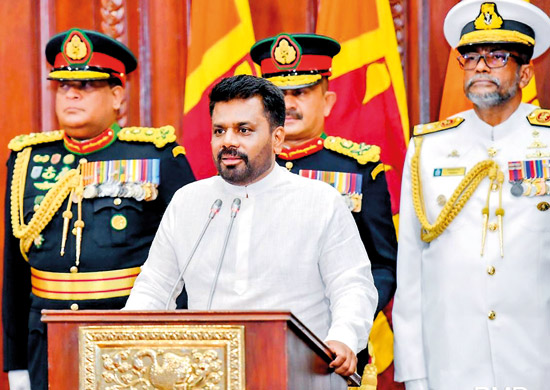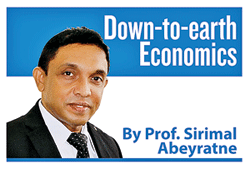Past is past, present leads to future
View(s):Sri Lanka and his team as “Leftist-oriented or Marxist-oriented”. In other words, it implies that
Sri Lanka’s emerging policy regime would be centred on protectionism, state-intervention and central planning.
I am not sure if this interpretation was true. The Janatha Vimukti Peramuna or the JVP (People’s Liberation Front) as well as its offspring, the National People’s Power (NPP) was hardly known as based on any leftist or Marxist ideology. Neither did the Sri Lankan electorate who voted them to power, anticipate a socialist or communist government as such.

Anura Kumara Dissanayake, speaking to the nation after being sworn in as President.
Within just five years, the NPP experienced a sharp increase in its vote base from just 3 per cent to 42 per cent of the voter turnout in order to secure its victory at the Presidential elections 2024. It is not at all that many people wanted to choose “socialism” to replace the market economy. It is naturally a result of growing frustration against the country’s traditional political power, triggered by the people’s hardship in life given the recent economic crisis.
Rhetoric and reality
This week, just a day after the new President was sworn in, on September 24 (Tuesday evening) I attended a discussion hosted by the Sunday Times Business Club at Shangri-La hotel. The discussion was on “Dissecting Sri Lanka’s Future” under the new administration.
 The topic was timely, as it had left many sensible questions to many. They all were centred on one question – which way the economy would move in? Today I thought of focusing on one of the major issues that the new administration must deal with – that is export growth.
The topic was timely, as it had left many sensible questions to many. They all were centred on one question – which way the economy would move in? Today I thought of focusing on one of the major issues that the new administration must deal with – that is export growth.
Quite contrary to the pre-election rhetoric at the election campaign, the President seems more pragmatic. In his maiden speech to the nation, he clearly stated the government’s commitment to continue with improving “economic stability and debt sustainability” in accordance with the IMF-supported program.
In continuing with the current programme that was commenced two years ago, we must constantly engage with the IMF and bring the debt restructuring to conclusion. This process also requires retaining the key positions without changing the faces, which he did too.
As far as economic recovery from the crisis and progress beyond the recovery are concerned, in fact, there is no Plan B; any other alternative that anyone can propose appears to be less-pragmatic and more-painful than what is being currently implemented.
Striking a balance
One of the major challenges that the government may have to deal with is “striking a balance” between election promises and fiscal consolidation. As per the election promises, lower fuel and electricity prices, tax cuts, salary hikes and increased subsidies are in the pipeline.
On the expenditure side too, cutting down wasteful or excessive government expenses and establishing “clean governance” have been proposed. The net outcome of all these measures on fiscal consolidation is yet to be known by implementation. To what extent these actions could affect the improvement in the “primary balance” and the reduction in “financing needs” is to be realised in the coming years.
After the conclusion of the debt restructuring process, Sri Lanka needs to commence its foreign debt repayment by ending the country’s “bankrupt” status. This requires a flow of foreign exchange earnings above and beyond the current level of about US$25 billion including services exports and remittances.
In addition, the country must improve its debt sustainability by reducing the current debt burden and the borrowing requirement. The 10-year targets for the period of (2022-2032) have already been set up within the debt sustainability analysis (DSA) in consultation with the IMF.
Export growth
The core of the above discussion reveals two-fold challenges that the new administration must overcome. The first is explicitly about the improvement in economic stability and debt sustainability. The second, which is even more challenging is the “export growth” ensuring a stable increase in foreign exchange flows.
Why export growth? In our previous discussions in this column on a number of occasions we have attempted to expose the primary cause of the country’s external debt problem. It is about the increased inability of the country to meet its maturing foreign debt obligations due to inadequate foreign exchange flows.
It is the export growth that would guarantee a stable “long-term” foreign exchange flow to a country. In the absence of export growth, the external finance position of the country is subject to the volatile “short-term” foreign exchange flows. The two types of foreign exchange flows also determine the long-term exchange rate trend and the short-term exchange rate fluctuations.
This has been the Sri Lankan experience for decades resulting in an increase in external debt against export growth. Sri Lanka’s outstanding external debt increased from 140 per cent of export earnings to 366 per cent within 20 years from 2000-2020. Accordingly, the country has been repaying $5-7 billion every year to settle maturing foreign debt. In April 2022, part of the external debt repayment had to be suspended.
Voice of the exporters
The National Chamber of Exporters (NCE) of Sri Lanka had submitted to the government a list of proposals for export promotion. The first three proposals are for trade facilitation, customs automation and tax reforms.
Reduction in time and costs of export-import procedures is a key area for reforms. As per international comparative data, Sri Lanka is lagging behind many of its neighbouring countries such as India, Malaysia and Thailand.
In spite of long-standing discussions on the establishment of a “national single window” system with fast-track automation,
Sri Lanka has so far failed to advance in this area. Apart from improving trade efficiency, automation would improve resource allocation, reduce trade costs and time, enhance tax revenue and lower opportunities for corruption. Exporters have also proposed for a simplified VAT system as well as for a functional VAT refund mechanism.
The NCE proposals also call for land and labour reforms as well as regulatory reforms in order to establish a competitive enabling environment for investment. The environment for doing business in
Sri Lanka must be improved for investment promotion.
Broad-based reforms
Export growth is the key to sustain and strengthen the country’s achievement in terms of economic stability and debt sustainability. It is also the key to sustain economic progress which would gradually improve income generation and job creation, reduce poverty and vulnerability, and enhance government’s tax revenue.
Export growth, however, requires a series of broad-based reform agenda aimed at promoting private investment from both domestic and foreign sources. Export growth depends on private investments and not public investments. As it was the underlying message of the NCE proposals too, Sri Lanka needs to present itself as a competitive business enclave in the region to attract private investments and to promote exports.
Here is the policy dilemma for the new government: As a political force that has played an influential role against reforms in the past, it must now make a complete turnaround embracing a full swing of reforms. There was no explicit message for reforms in its pre-election campaign, but now it is the key for assuring economic progress.
“Clean politics”
The promise for “clean politics” by ending corruption and restoring rule of law is important not only for strengthening its political ground, but also for restoring the enabling business environment for investment.
This is an area where all our traditional political parties were caught up, leading to their own failure as well as to the economic failure of the nation. The IMF too has recognised “corruption vulnerability” as a major issue hindering
Sri Lanka’s economic progress.
The past is already gone, leaving no room for any course correction. But there is a future. It is the present that determines the future of the nation as well as the future of the new government.
(The writer is Emeritus Professor of Economics at the University of Colombo and can be reached at sirimal@econ.cmb.ac.lk and follow on Twitter @SirimalAshoka)
Hitad.lk has you covered with quality used or brand new cars for sale that are budget friendly yet reliable! Now is the time to sell your old ride for something more attractive to today's modern automotive market demands. Browse through our selection of affordable options now on Hitad.lk before deciding on what will work best for you!


